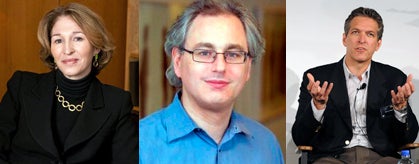
After a day of winter activities under crisp blue skies and engaging in three dynamic seminars in Aspen, Colorado, over 70 Socrates participants listened to Charles Kenny, senior fellow at the Center for Global Development, interview Princeton professor Anne-Marie Slaughter in a fireside chat, “Next Steps in the Work-Family Revolution.” In response to a question regarding drawbacks and benefits of technology as it relates to work-life balance, Slaughter reflected that her son once drew her not as a person, but as a laptop in a family portrait. The anecdote drew laughs from the audience, but the point was serious: technology has significantly impacted the way we work, socialize, and function. The evolving role of technology in our lives was thematic in all three Socrates Seminars. Author of The New York Times best-selling book, Hamlet’s Blackberry, Bill Power’s seminar on information overload and big data, one participant, Marc Porat, an entrepreneur in sustainable information technologies, argued that, “The edge of creepiness is where we want to be” shedding light on the values, shared and otherwise, that will impact the future of technology. In Charles Kenny’s seminar on happiness economics in the workforce, participants debated the psychological effects of technology, such as “FOMO” (fear of missing out) as a byproduct of social media and constant communication. In Anne-Marie Slaughter’s seminar on the American Dream, participants discussed how technology will affect opportunities for individual equality and mass economic growth. The Socrates weekend drew a diverse group of participants from across the United States and eight countries.

The American Dream: Can We Repair It?
The American Dream is typically framed in terms of economics: the United States is a land to which anyone can come and make their fortune. However many middle class Americans today feel constrained by stagnant wages and salaries, job losses, the increasing burden of paying for their own retirement and health care, and are vulnerable to new economic insecurities from technological change and globalization. And with the rise of a global middle class, Americans will need be progressively innovative to compete globally. Is this just a temporary setback for the American workforce or is the dream of a better life for Americans and their children moving out of reach? Is it the American economy or American values in need of repair? How can we reinvest in our communities and rebuild local economies as centers of value connected to the global economy? This seminar will explore ways in which the American Dream can be repaired including innovation research, the slow money movement and sharing economy, connected capitalism, and how women and men can make work and family work.
Moderator: Anne-Marie Slaughter, Bert G. Kerstetter ’66 University Professor of Politics and International Affairs at Princeton University
So Much Information, So Little Time: Making Sense of a Big Data World
Digital technology has made it possible to create, move and store information at previously unthinkable magnitudes. As a result, individuals and organizations are navigating an ever-growing ocean of data, including billions of new emails and social-media comments each day. Where is Big Data taking us? Is access to the ever-expanding digital trove making us more creative and productive, or just more overwhelmed? Is the workplace becoming more efficient, or is hyper-connectedness exacting a price? This seminar focuses on both the promise and challenges of the digital era. It will examine the history of information overload – it’s not as new as you might think – as well as twists that are unique to the 21st century. We’ll look at what scientists are learning about the cognitive issues – how can we process all this information? And we’ll glimpse over the horizon at innovations that might help society meet this challenge, and define the next stage of the information revolution.
Moderator: Bill Powers, author of the New York Times bestseller, Hamlet’s BlackBerry
Happy: Healthy, Wealthy and Wise? Happiness Economics in the Workforce and the World
What makes people happy? And could happier workers be the secret to success? Happiness economics is an exploding field analyzing global data on survey answers to the question “do you consider yourself happy?” Research has proven links between happiness and income, employment, religion, values, genes, and good looks. How those links are utilized can pose ethical challenges. Does having kids make you happier? Do happy people go on to earn more, or does earning more make you happier? Which matters more: status or pay? Is subjective happiness all that we should care about in life? This seminar will examine underlying assumptions of happiness polls, and drivers towards success and happiness.
Moderator: Charles Kenny, senior fellow at the Center for Global Development

